译林牛津初一上册英语知识点归纳
- 格式:pdf
- 大小:536.05 KB
- 文档页数:10
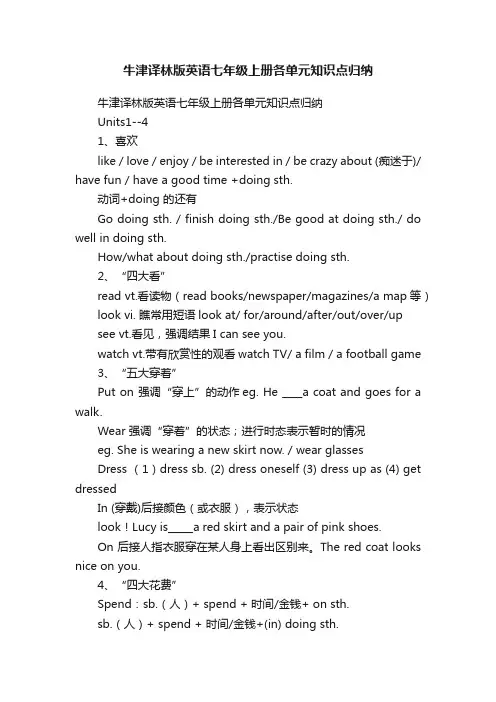
牛津译林版英语七年级上册各单元知识点归纳牛津译林版英语七年级上册各单元知识点归纳Units1--41、喜欢like / love / enjoy / be interested in / be crazy about (痴迷于)/ have fun / have a good time +doing sth.动词+doing 的还有Go doing sth. / finish doing sth./Be good at doing sth./ do well in doing sth.How/what about doing sth./practise doing sth.2、“四大看”read vt.看读物(read books/newspaper/magazines/a map等)look vi. 瞧常用短语look at/ for/around/after/out/over/upsee vt.看见,强调结果I can see you.watch vt.带有欣赏性的观看watch TV/ a film / a football game3、“五大穿着”Put on 强调“穿上”的动作eg. He ____a coat and goes for a walk.Wear 强调“穿着”的状态;进行时态表示暂时的情况eg. She is wearing a new skirt now. / wear glassesDress (1)dress sb. (2) dress oneself (3) dress up as (4) get dressedIn (穿戴)后接颜色(或衣服),表示状态look!Lucy is_____a red skirt and a pair of pink shoes.On 后接人指衣服穿在某人身上看出区别来。
The red coat looks nice on you.4、“四大花费”Spend:sb.(人)+ spend + 时间/金钱+ on sth.sb.(人)+ spend + 时间/金钱+(in) doing sth.pay:sb.(人)+pay + 金钱+for sth.cost:sth.(物) + cost + sb.+金钱Doing sth.costs + sb.+时间take:it takes sb. +时间+ to do sth.5、“三大地点副词”Home / there /here 前不加任何的介词welcome home / come here / go there6、“三大使役动词”Make sb. do sth./ have sb. do sth. / let sb.do sth.7、见面打招呼用语(1)Nice to meet you . (2) Glad to meet you . (3) How are you ? (4) How are you doing ?(5)How is it going ? (6)How is everything going? (7) What’s up?8、基数词+year(s)+old 表示“…岁”提问用“how old”名词性短语数词-year-old 也表示年龄,但其为形容词性短语“前有冠词后有名(词)”Eg. Helen is 11 years old = Helen is an 11-year-old girl.9、Let’s 与let us 的区别Let’s do sth. 指包括听者(对方)和说者(我们)都在内,表示建议Let us do sth.指“让(允许)我们做某事”而听者(对方)不做,只有“我们”做10、play+the+乐器类名词e.g. Play the pianoPlay + 球类运动play+ football / play cards / play chess11、She comes from Shanghai= She is from Shanghai . 注:如何提问Shanghai 及如何改一般疑问句12、be good at =do well in = be clever at = study sth. wellBe good at (反) be bad at do well in (反) be poor in13、介词over的用法(1)”在…正上方” There is a bridge over the river.(2)”越过” A plane flies over the house(3)”超过” There are over 20 boys in this class.(4)”结束” Class is over! / Game is ove r.14、every one 与everyone 辨析区别(1)Every one 可以与of 连用,而everyone 却不能与of连用Eg.every one of the children likes playing the computer games.(2) everyone 只指人=everybody而every one 既指人又可指物共同点:谓语动词都要用“三单”15、family 的用法:“家庭”作为整体谓语动词用“单数”He has a big family.“家人”强调成员,是复数含义,谓语动词用“原形” My family are at home.拓展:集体名词有people、class、police、sheep、deer、furniture等16、all/ both/ each/every/neither/ either 的用法all (1)三者或三者以上“全部、都”(2)all + the + 名词(all the afternoon = the whole afternoon)(3)all 放在行为动词前,名词前;be 动词后(4) all of +宾格/名词复数Both(1)两者都(2)后可跟of +宾格/名词复数Both sides of the street are grown trees.Each 指两个或两个以上“每一个”个体Each side of the street is grown trees.Every 指许多人或事物的“全体”后接名词单数Every student is here . 所有人都在。
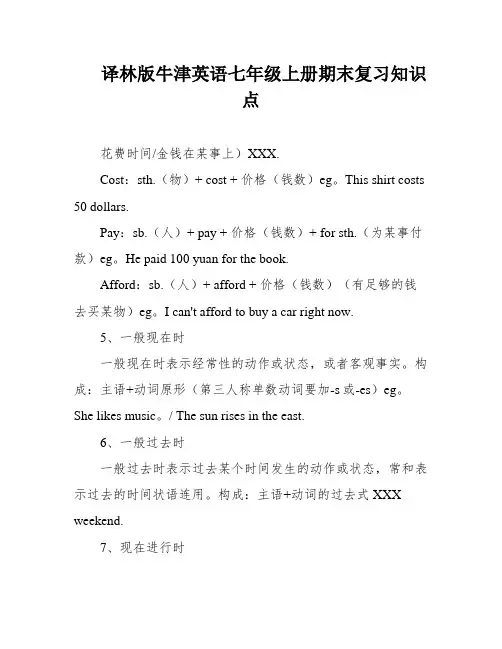
译林版牛津英语七年级上册期末复习知识点花费时间/金钱在某事上)XXX.Cost:sth.(物)+ cost + 价格(钱数)eg。
This shirt costs 50 dollars.Pay:sb.(人)+ pay + 价格(钱数)+ for sth.(为某事付款)eg。
He paid 100 yuan for the book.Afford:sb.(人)+ afford + 价格(钱数)(有足够的钱去买某物)eg。
I can't afford to buy a car right now.5、一般现在时一般现在时表示经常性的动作或状态,或者客观事实。
构成:主语+动词原形(第三人称单数动词要加-s或-es)eg。
She likes music。
/ The sun rises in the east.6、一般过去时一般过去时表示过去某个时间发生的动作或状态,常和表示过去的时间状语连用。
构成:主语+动词的过去式XXX weekend.7、现在进行时现在进行时表示现在正在进行的动作,常和now。
XXX。
currently等时间状语连用。
构成:主语+be动词(am/is/are)+动词-XXX.8、一般将来时一般将来时表示将来某个时间要发生的动作或状态,常和表示将来的时间状语连用。
构成:主语+will/shall+动词原形eg。
I will go to Beijing next month。
/ She shall visit her XXX.9、情态动词情态动词有can/could。
may/might。
must。
shall/should。
will/would。
ought to等。
它们的用法有所不同,但都表示某种语气或情态。
eg。
You should study hard for the exam。
/ She must be at home now.10、被动语态被动语态表示动作的承受者在句子中作主语,动作的执行者在句子中用by引出。
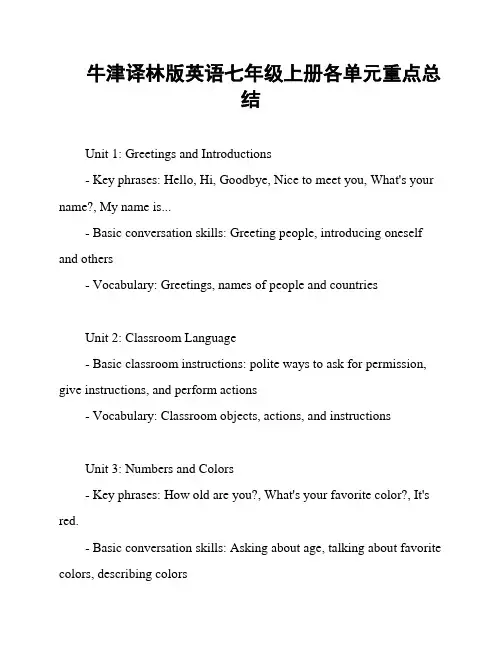
牛津译林版英语七年级上册各单元重点总结Unit 1: Greetings and Introductions- Key phrases: Hello, Hi, Goodbye, Nice to meet you, What's your name?, My name is...- Basic conversation skills: Greeting people, introducing oneself and others- Vocabulary: Greetings, names of people and countriesUnit 2: Classroom Language- Basic classroom instructions: polite ways to ask for permission, give instructions, and perform actions- Vocabulary: Classroom objects, actions, and instructionsUnit 3: Numbers and Colors- Key phrases: How old are you?, What's your favorite color?, It's red.- Basic conversation skills: Asking about age, talking about favorite colors, describing colors- Vocabulary: Numbers, colors, ageUnit 4: My Family- Key phrases: How many people are there in your family?, This is my mother/father/sister/brother.- Basic conversation skills: Talking about family members, describing family relationships- Vocabulary: Family members, possessive pronounsUnit 5: My School- Key phrases: What's your favorite subject?, Do you like...?, Yes, I do. / No, I don't.- Basic conversation skills: Talking about school subjects, expressing likes and dislikes- Vocabulary: School subjects, opinionsUnit 6: My Friends- Key phrases: Who's your best friend?, What does he/she look like?, He/She is...- Basic conversation skills: Talking about friends, describing appearance- Vocabulary: Words to describe people's physical appearanceUnit 7: Free Time Activities- Key phrases: What do you do in your free time?, I like playing football / reading books / listening to music.- Basic conversation skills: Talking about hobbies and free time activities- Vocabulary: Hobbies and leisure activitiesUnit 8: Daily Routines- Key phrases: What time do you get up/go to bed/eat breakfast?, I get up at.../Go to bed at.../Eat breakfast at...- Basic conversation skills: Talking about daily routines and telling the time- Vocabulary: Daily activities, timeUnit 9: Food and Drinks- Key phrases: Do you like...?, Yes, I do. / No, I don't., Can I have some...?, Sure, here you are.- Basic conversation skills: Talking about food preferences, ordering food and drinks- Vocabulary: Food and drinks, likes and dislikesUnit 10: Clothes- Key phrases: What are you wearing?, I'm wearing a T-shirt/trousers/skirt/shoes, etc.- Basic conversation skills: Talking about clothes and describing what someone is wearing- Vocabulary: Clothing itemsUnit 11: Weather- Key phrases: What's the weather like today?, It'ssunny/rainy/cloudy/windy, etc.- Basic conversation skills: Talking about the weather and describing weather conditions- Vocabulary: Weather words and phrasesUnit 12: Holidays and Celebrations- Key phrases: When is...?, It's on..., What do people do on...?, People usually...- Basic conversation skills: Talking about holidays and celebrations, discussing traditions and customs- Vocabulary: Holidays and celebrations, activities以上是牛津译林版英语七年级上册各单元的重点总结,希望对您有所帮助。
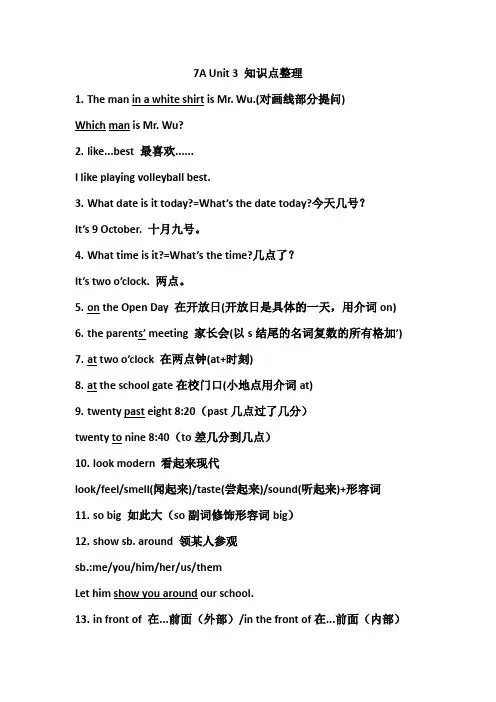
7A Unit 3 知识点整理1.The man in a white shirt is Mr. Wu.(对画线部分提问)Which man is Mr. Wu?2.like...best 最喜欢......I like playing volleyball best.3.What date is it today?=What’s the date today?今天几号?It’s 9 October. 十月九号。
4.What time is it?=What’s the time?几点了?It’s two o’clock. 两点。
5.on the Open Day 在开放日(开放日是具体的一天,用介词on)6.the parents’ meeting 家长会(以s结尾的名词复数的所有格加’)7.at two o’clock 在两点钟(at+时刻)8.at the school gate在校门口(小地点用介词at)9.twenty past eight 8:20(past几点过了几分)twenty to nine 8:40(to差几分到几点)10.look modern 看起来现代look/feel/smell(闻起来)/taste(尝起来)/sound(听起来)+形容词11.so big 如此大(so副词修饰形容词big)12.show sb. around 领某人参观sb.:me/you/him/her/us/themLet him show you around our school.13.in front of 在...前面(外部)/in the front of在...前面(内部)Miss Li is standing in the front of our classroom and writing some new words on the blackboard.There is a tree in front of our house.14.on the ground/first/second/third floor在一楼/二楼/三楼/四楼The cinema is on the third floor.15.two classroom buildings两栋教学楼名词修饰名词时一般第一个名词用单数,但也有一些特例:clothes shops/sports shops/women teachers/men doctors16.have meetings/have a meeting 开会I want to know when to have the meeting.17.the man in a white shirt/the man in white穿着白衬衫的男的/穿着白衣服的男的in介词+颜色/衣服:穿着......(状态) The man in white is my brother.wear动词+衣服:穿着......(状态) I wear a red coat today.put on动词短语+衣服:穿上......(动作)It’s cold outside. Please put on your coat.18.the man with glasses 戴眼镜的那个男的(with介词:戴着)Who is the man with glasses?(句中有谓语,用介词with)Daniel wears glasses.(句中无谓语,用动词wear作谓语)19.look(v.) at=have a look(n.) at 看一看......Let me look at the picture.=Let me have a look at the picture.20.the pictures of my friends 我朋友们的照片21.on the wall 在墙上There is a picture on the wall.(墙上挂的或贴的东西用on)There is a hole in the wall.(墙内部的用in)22.Let me see. 让我想想。
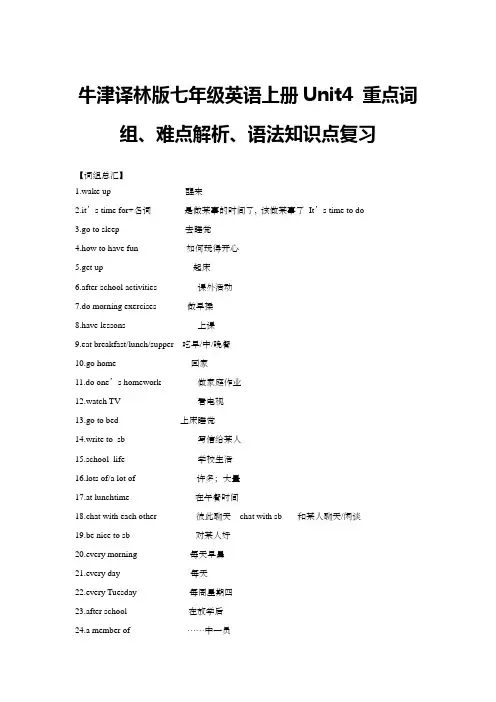
牛津译林版七年级英语上册Unit4 重点词组、难点解析、语法知识点复习【词组总汇】1.wake up 醒来2.it’s time for+名词是做某事的时间了, 该做某事了It’s time to do3.go to sleep 去睡觉4.how to have fun 如何玩得开心5.get up 起床6.after-school activities 课外活动7.do morning exercises 做早操8.have lessons 上课9.eat breakfast/lunch/supper 吃早/中/晚餐10.go home 回家11.do one’s homework 做家庭作业12.watch TV 看电视13.go to bed 上床睡觉14.write to sb 写信给某人15.school life 学校生活16.lots of/a lot of 许多;大量17.at lunchtime 在午餐时间18.chat with each other 彼此聊天chat with sb 和某人聊天/闲谈19.be nice to sb 对某人好20.every morning 每天早晨21.every day 每天22.every Tuesday 每周星期四23.after school 在放学后24.a member of ……中一员25.the Swimming Club 游泳兴趣小组26.have a good time 玩的开心27.email sb 给某人发电子邮件28.play games 玩游戏, 进行比赛29.twice a week 一周两次30.have fun 娱乐,乐趣;开心P.27-3031.listen to the radio 听收音机32.make a model plane 制作模型飞机33.read newspapers 看报read books 看书34.write emails 写邮件35.watch football matches 看球赛36.watch too much TV 看电视太多37.listen to music 听音乐38.listen to the teacher 听老师讲39.walk a dog 遛狗40.a piece of good news 一则好消息41.in the school football team 在学校足球队42.all the time 一直43.know (a lot) about…对……了解(很多)44.read comic books 看连环漫画书45.on the volleyball court 在排球场46.from...to…从……到……47.meet up with sb. 约见某人48.do their homework 做他们的作业49.under a big tree 在大树下50.go to one’s dancing lesson 去上舞蹈课51.have (no) time to do sth. 有(没有)时间做某事52.have a lot of new friends 有许多新朋友53.teach us English 教我们英语54.talk about…谈论关于……55.at home 在家56.say hello to…向……问好P.31-3757.the Class 1,Grade 7 students 七年级一班学生58.go on a trip 旅行, 旅游have one’s trip59.look at the posters 看海报60.more than 多于;超过61.twice a week 一星期两次62.the China Space Museum 中国航空博物馆63.the China Science and Technology Museum 中国科技博物馆64.next Monday 下周一65.each student 每个学生66.thank you for doing sth 为做某事而谢谢你anize the class trip 组织班级旅游68.I would like to+动词原形愿意干某事;想要干某事69.the price for………的价格70.be open/be closed 开着、关着71.look forward to…期盼;盼望72.enjoy…very much 非常喜爱……73.need to do sth 需要做……74.borrow a pen 借一支钢笔75.be busy doing 忙于做某事76.be good for 有益于77.help sb do sth 帮助某人做某事78.get ready for 准备……79.learn more about 更多了解……80.the answer to ………的答案81.the Computer Club 电脑兴趣小组【难点解析】1.Is it time for breakfast? 是吃早餐的时间了吗?it’s time for+名词, “是做某事的时间了, 该做某事了”=it’s time to+动词原形.例如:It’s time for class.是上课的时间了。
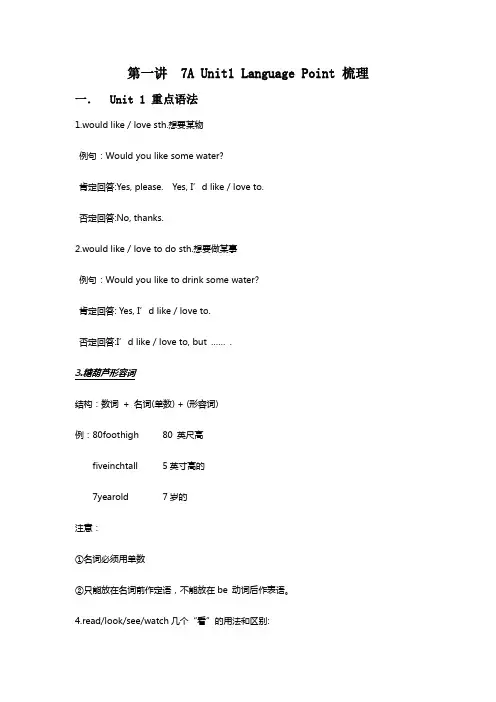
第一讲 7A Unit1 Language Point 梳理一.Unit 1 重点语法1.would like / love sth.想要某物例句:Would you like some water?肯定回答:Yes, please. Yes, I’d like / love to.否定回答:No, thanks.2.would like / love to do sth.想要做某事例句:Would you like to drink some water?肯定回答: Yes, I’d like / love to.否定回答:I’d like / love to, but …… .3.糖葫芦形容词结构:数词+ 名词(单数) + (形容词)例:80foothigh 80 英尺高fiveinchtall 5英寸高的7yearold 7岁的注意:①名词必须用单数②只能放在名词前作定语,不能放在be 动词后作表语。
4.read/look/see/watch几个“看”的用法和区别:look 强调看的动作①系动词。
译作看起来,后接形容词。
She looks happy.②不及物动词。
译作看,词组:look at…,用副词修饰。
Tom looked at me angrily.see 及物动词,译作看到,无进行时态,强调看的结果。
watch 及物动词,译作观看,注视。
强调观看正在进行中的,发生变化的活动过程,常用于看电视、看球赛、看演出等。
read 及物动词,译作阅读。
强调看文字内容的东西,常用于看书、看报纸、看杂志等。
5.疑问代词what、which、who 及疑问副词how、when 、where可以和动词不定式连用。
what to do 做什么which to do 做哪个who to do 如何做how to do 谁做when to do 什么时候做where to do 在哪里做6.“疑问词+ to do” 结构经常放在know,learn,see ,ask等动词后做宾语。
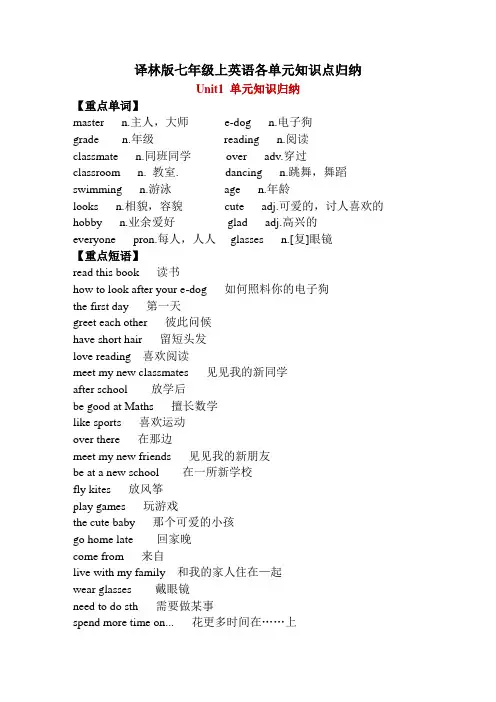
译林版七年级上英语各单元知识点归纳Unit1 单元知识归纳【重点单词】master n.主人,大师e-dog n.电子狗grade n.年级reading n.阅读classmate n.同班同学over adv.穿过classroom n. 教室. dancing n.跳舞,舞蹈swimming n.游泳age n.年龄looks n.相貌,容貌cute adj.可爱的,讨人喜欢的hobby n.业余爱好glad adj.高兴的everyone pron.每人,人人glasses n.[复]眼镜【重点短语】read this book 读书how to look after your e-dog 如何照料你的电子狗the first day 第一天greet each other 彼此问候have short hair 留短头发love reading 喜欢阅读meet my new classmates 见见我的新同学after school 放学后be good at Maths 擅长数学like sports 喜欢运动over there 在那边meet my new friends 见见我的新朋友be at a new school 在一所新学校fly kites 放风筝play games 玩游戏the cute baby 那个可爱的小孩go home late 回家晚come from 来自live with my family 和我的家人住在—起wear glasses 戴眼镜need to do sth 需要做某事spend more time on... 花更多时间在……上【典句必背】What’s your name? 你叫什么名字?Nice to meet you.见到你很髙兴。
I love reading.我爱读书。
I often play football after school.放学后我经常踢足球。
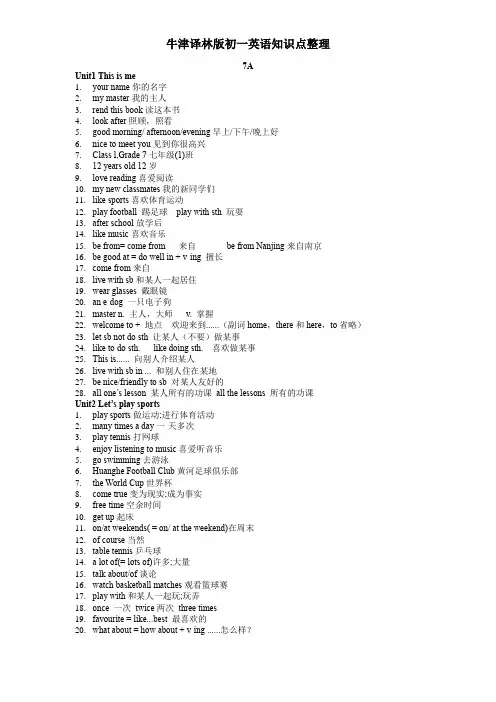
7AUnit1 This is me1.your name你的名字2.my master我的主人3.rend this book读这本书4.look after照顾,照看5.good morning/ afternoon/evening早上/下午/晚上好6.nice to meet you见到你很高兴7.Class l,Grade 7七年级(1)班8.12 years old 12岁9.love reading喜爱阅读10.my new classmates我的新同学们11.like sports喜欢体育运动12.play football 踢足球play with sth 玩耍13.after school放学后14.like music喜欢音乐15.be from= come from 来自be from Nanjing来自南京16.be good at = do well in + v-ing 擅长e from来自18.live with sb和某人一起居住19.wear glasses 戴眼镜20.an e-dog 一只电子狗21.master n. 主人,大师v. 掌握22.welcome to + 地点欢迎来到......(副词home,there和here,to省略)23.let sb not do sth 让某人(不要)做某事24.like to do sth. like doing sth. 喜欢做某事25.This is...... 向别人介绍某人26.live with sb in ... 和别人住在某地27.be nice/friendly to sb 对某人友好的28.all one’s lesson 某人所有的功课all the lessons 所有的功课Unit2 Let’s play sports1.play sports做运动;进行体育活动2.many times a day一-天多次3.play tennis打网球4.enjoy listening to music喜爱听音乐5.go swimming去游泳6.Huanghe Football Club黄河足球俱乐部7.the World Cup世界杯e true变为现实;成为事实9.free time空余时间10.get up起床11.on/at weekends( = on/ at the weekend)在周末12.of course当然13.table tennis乒乓球14. a lot of(= lots of)许多;大量15.talk about/of谈论16.watch basketball matches观看篮球赛17.play with和某人一起玩;玩弄18.once 一次twice两次three times19.favourite = like...best 最喜欢的20.what about = how about + v-ing ......怎么样?21.be a member of = be in 成为......其中的一员22.look +adj look at + adv23.in one’s free/spare time 在某人的空闲时间24.enjoy doing sth 喜欢做某事25.make sb. do sth.使/让某人做某事make sb./sth. + adj.使某人/某物处于.....状态26.want to do sth = would like to do sth 想要做某事27.hope to do sth 希望做某事hope sb will/can do sth 希望某人做某事没有hope sb to do sth28.talk with sb about sth 和某人谈论某事29.fun 不可数名词funny 有趣的have fun +v-ing 做某事玩得愉快30.feel + adj31.reading is fun. 动名词作主语,谓语动词用单数形式。
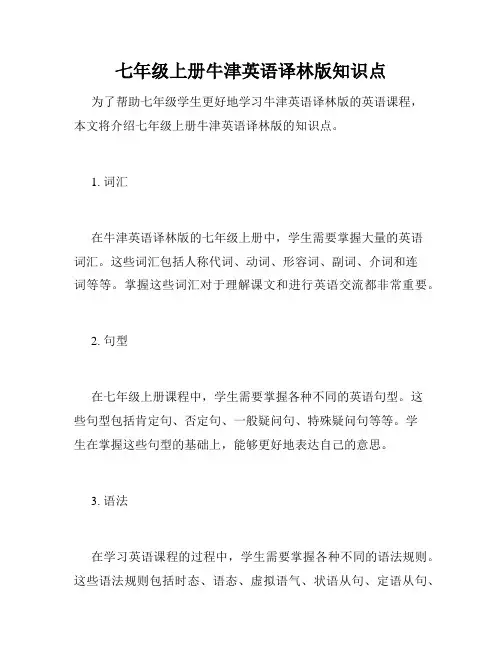
七年级上册牛津英语译林版知识点为了帮助七年级学生更好地学习牛津英语译林版的英语课程,本文将介绍七年级上册牛津英语译林版的知识点。
1. 词汇在牛津英语译林版的七年级上册中,学生需要掌握大量的英语词汇。
这些词汇包括人称代词、动词、形容词、副词、介词和连词等等。
掌握这些词汇对于理解课文和进行英语交流都非常重要。
2. 句型在七年级上册课程中,学生需要掌握各种不同的英语句型。
这些句型包括肯定句、否定句、一般疑问句、特殊疑问句等等。
学生在掌握这些句型的基础上,能够更好地表达自己的意思。
3. 语法在学习英语课程的过程中,学生需要掌握各种不同的语法规则。
这些语法规则包括时态、语态、虚拟语气、状语从句、定语从句、宾语从句和主语从句等等。
掌握这些语法规则对于学生更好地理解和运用英语至关重要。
4. 阅读理解在牛津英语译林版的七年级上册中,学生需要完成大量的阅读理解练习。
这些阅读理解练习可以帮助学生提高阅读理解能力和对英语文章的理解程度。
对于学生来说,这是一个提高英语综合能力的重要环节。
5. 课文七年级上册的课文内容非常丰富,包括生日聚会、购物、旅游、家庭等话题。
学生需要认真阅读每一篇课文,理解课文中的语言表达和文化内涵。
同时,学生也需要通过朗读和背诵等方式增加对课文的印象和理解。
总结七年级上册牛津英语译林版的内容非常丰富,学生需要掌握大量的单词、句型、语法和阅读理解能力。
在学习的过程中,学生需要注重英语语言和文化的理解和领悟,同时也需要通过多种方式提高英语的听、说、读、写能力。
希望学生们通过不断地学习和实践,能够更好地掌握牛津英语译林版的英语知识点。
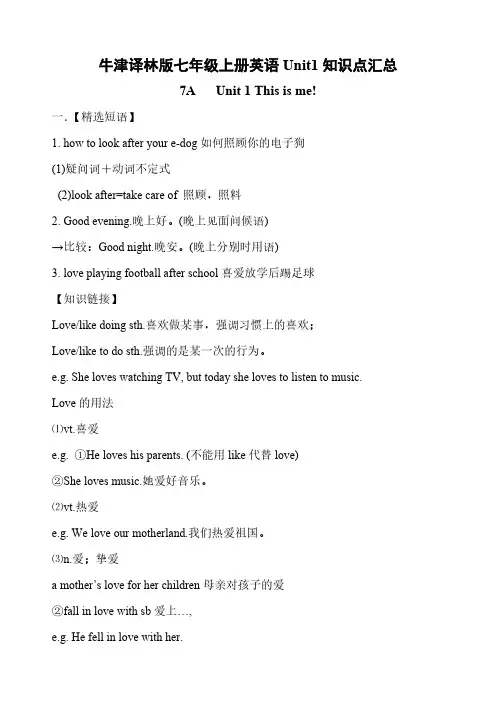
牛津译林版七年级上册英语Unit1知识点汇总7A Unit 1 This is me!一.【精选短语】1. how to look after your e-dog如何照顾你的电子狗(1)疑问词+动词不定式(2)look after=take care of 照顾,照料2. Good evening.晚上好。
(晚上见面问候语)→比较:Good night.晚安。
(晚上分别时用语)3. love playing football after school喜爱放学后踢足球【知识链接】Love/like doing sth.喜欢做某事,强调习惯上的喜欢;Love/like to do sth.强调的是某一次的行为。
e.g. She loves watching TV, but today she loves to listen to music. Love的用法⑴vt.喜爱e.g. ①He loves his parents. (不能用like代替love)②She loves music.她爱好音乐。
⑵vt.热爱e.g. We love our motherland.我们热爱祖国。
⑶n.爱;挚爱a mother’s love for her children母亲对孩子的爱②fall in love with sb爱上…,e.g. He fell in love with her.③我们可在书信的结尾处看到例如Love Mary这样的署名,意思是With my love, Mary,一方面表示情感,一方面表示道别。
【用法拓展】lovely美丽的;可爱的e.g. lovely hair秀发,a lovely girl美丽的少女4. be good at sth/doing sth=do well in sth/doing sth擅长;在某方面表现好【知识链接】⑴He is good at telling funny jokes.⑵She always does well in English.5. wear glasses戴眼镜→ wear后接服装、装饰品等,表示“穿、戴”。
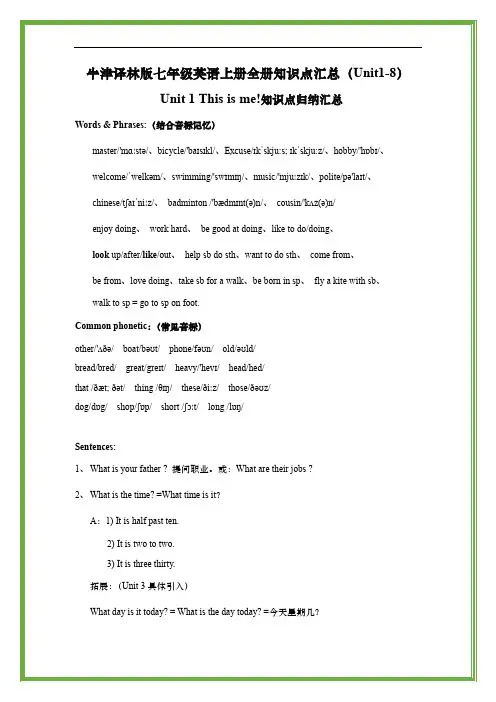
牛津译林版七年级英语上册全册知识点汇总(Unit1-8)Unit 1 This is me!知识点归纳汇总Words & Phrases:(结合音标记忆)master/'mɑːstə/、bicycle/'baɪsɪkl/、Excuse/ɪkˈskju:s; ɪkˈskju:z/、hobby/'hɒbɪ/、welcome/ˈwelkəm/、swimming/'swɪmɪŋ/、music/'mjuːzɪk/、polite/pə'laɪt/、chinese/tʃaɪˈniːz/、badminton /'bædmɪnt(ə)n/、cousin/'kʌz(ə)n/enjoy doing、work hard、be good at doing、like to do/doing、look up/after/like/out、help sb do sth、want to do sth、come from、be from、love doing、take sb for a walk、be born in sp、fly a kite with sb、walk to sp = go to sp on foot.Common phonetic:(常见音标)other/'ʌðə/ boat/bəʊt/ phone/fəʊn/ old/əʊld/bread/bred/ great/greɪt/ heavy/'hevɪ/ head/hed/that /ðæt; ðət/ thing /θɪŋ/ these/ðiːz/ those/ðəʊz/dog/dɒg/ shop/ʃɒp/ short /ʃɔːt/ long /lɒŋ/Sentences:1、What is your father ? 提问职业。
牛津译林版七年级英语上册Unit 1 This is me一.Comic strip- Reading(一)重点短语、交际用语1.read this book 读这本书2. look after 照顾,照看3. play football 踢足球4. after school 放学后5. be from 来自......6. be good at 擅长7. good morning 早上好,上午好8. good afternoon 下午好9. good evening 晚上好10. What's your name? 你叫什么名字?11. Nice to meet you. 见到你很高兴。
12. Nice to meet you too. 见到你也很高兴。
(二) 语言知识梳理1. Oh, I love e-dogs. 哦,我喜爱电子狗。
【知识点1】love 的用法句中的love 是实义动词,表示“喜爱,热爱,喜欢”,love 有强烈的感情色彩,相当于like...very much, 其后可以直接接名词、代词、动名词或动词不定式做宾语。
例如:We should love the students. (接名词)我们应该关爱学生。
Do you love me, mom? (接代词)妈妈,你爱我吗?My friend Bill loves to listen to music. (接不定式)= My friend Bill loves listening to music. (接动名词)我的朋友比尔喜爱听音乐。
【知识拓展】love 做名词的用法love 本身也可做名词,表示“爱”。
例如:My mother's love for me is very deep. 妈妈对我的爱是很深的。
【知识点2】e-dog 的含义e-dog 做名词,是由electronic, dog 两个单词合并而成的,electronic 可译为“电子的”。
牛津译林版英语七年级上册全册知识点归纳总结(最新)Unit one一、词汇知识点整理:look after \ take care of 照顾;表示look 的短语:look after照顾look at 看…;look for 寻找look like 看起来像…on the first day 在第一天Class One, Grade Seven (先说班级,再说年级,且大写)。
play football 踢足球after school 放学后be\come from 来自be good at \do well in 擅长fly kites 放风筝go home 回家listen to music 听音乐play a game 玩游戏wear glasses 戴眼镜at school 在学校all the lessons 所有的课程talk about 谈论over there 那里 a lot of hobbies 许多爱好二、结构用法:love\like doing sth 喜欢做某事let’s +动词原形让我们I am\My name is 我叫welcome to +地点欢迎来到This is 这是be good at \do well in doing 擅长做in Class…Grade…在几年级几班be from = come from + 地点, 意思是“来自某地”。
He is from Nanjing. P8 他来自南京。
live with…in…和谁住在哪里live with sb 和某人住一起;live in+ 城市名,住在某地;live on the ground floor 住在一楼(用介词on)I’m …year old. 我几岁了。
year(s) old ,……岁,如果数词大于1,year 要用复数years. 问年龄要用How old “几岁”提问。
例如:- is your sister? --- She is 11. 应填How old.I have (short/long)hair.我留着短(长)头发三、句式用法What’s your name?你叫什么名字?Nice to meet you! 很高兴见到你。
初一英语Unit 1This is me!短:look after \ take care of 照on the first day 在第一天Class 1,Grade 7 7年 1 班play football 踢足球after school 下学后be\come from 来自be good at \do well in 擅fly kite s放筝go home 回家listen to music 听音play a game 玩游wear glasses 戴眼at school 在学校all the lessons 全部的程talk about over there 那边a lot of hobbies 多好用法集萃:love\like doing sth 喜做某事let’s +原形我I am\My name is 我叫welcome to +地址迎到达This is 是be good at \do well in doing 擅做in Class ⋯Grade⋯在几年几班live with ⋯in⋯和住在哪里I ’m ⋯ year old. 我几了。
I have⋯hair.我留着⋯⋯典句背What’s your name?你叫什么名字?Nice to meet you! 很高到你。
I love reading. 我喜Now let ’s meet our new classmates.在我下我的新同学。
I often play football after school.下学后我常踢足球。
She is tall and slim. 她个很高,身材苗条。
He is from Nanjing. 他来自南京。
He is good at Maths. 他擅于数学。
Millie is 11 years old. 米莉 11 。
They are all very nice.他都很好。
I am good at dancing. 我擅于跳舞。
译林版牛津初中英语七年级上册全册各单元短语、句型归纳整理Unit 1 This is me!短语:1.look after sb。
- take care of someone2.some of the new students - a few of the new studentsone of + plural countable noun - one of the。
many of + plural countable noun - many of the。
much of + uncountable noun - much of the。
3.love doing。
- enjoy doing。
like doing。
- like to do。
enjoy doing。
- love to do。
4.let sb。
do sth。
- allow someone to do something5.make sb。
do sth。
- force someone to do somethingThe verb "let" and "make" are followed by the base form of the verb with "to" as the object complement.6.like sports - enjoy sports7.after class - after the classin class - during the class8.be good at (doing)。
- be skilled at (doing)。
9.meet my new friends - meet my new classmates10.over there - in that n11.tell sb。
about sth。
- inform someone about something12.Oh。
初一英语Unit 1 This is me短语归纳:look after \ take care of 照顾 on the first day 在第一天Class 1;Grade 7 7年级1班 play football 踢足球after school 放学后 be\come from 来自be good at \do well in 擅长 fly kite s 放风筝go home 回家 listen to music 听音乐play a game 玩游戏 wear glasses 戴眼镜at school 在学校 all the lessons 所有的课程talk about 谈论 over there 那里a lot of hobbies 许多爱好用法集萃:love\like doing sth 喜欢做某事 let’s +动词原形让我们I am\My name is 我叫 welcome to +地点欢迎来到This is 这是 be good at \do well in doing 擅长做in Class…Grade…在几年级几班 live with…in…和谁住在哪里I’m …year old. 我几岁了.. I have…hair.我留着……头发典句背诵What’s your name 你叫什么名字Nice to meet you 很高兴见到你..I love reading. 我喜欢阅读Now let’s meet our new classmates. 现在让我们认识下我们的新同学..I often play football after school.放学后我经常踢足球..She is tall and slim. 她个头很高;身材苗条..He is from Nanjing. 他来自南京..He is good at Maths. 他擅长于数学..Millie is 11 years old.米莉11岁..They are all very nice.他们都很好..I am good at dancing. 我擅长于跳舞..语法:连系动词be 的一般现在时动词be 的三变化 am is are. 我I 用am ;你you用are ;is 用于他he她she它it;单数名词用is;复数名词都用are句型结构:1、肯定句:主语+am\is\are … It is a football.2、否定句:主语+am\is\are+not… It is not a football.3、一般疑问句:Am\Is\Are+主语+其他Is it a football 回答 Yes; it is. No; it isn’t4、特殊疑问句:疑问句+am/is/are +主语+其他What’s your nameUnit 2 Let's play sports短语归纳:play sports 做运动 many times a day 一天许多次play football/tennis 踢足球/打网球 talk about 谈论after school 放学后 go swimming 去游泳a member of …中的一员 come from 来自listen to music 听音乐 in the next World Cup 在下届世界杯come true 实现 in one’s free time 在某人的空闲时间live in 住/生活在 read books 看书at/ on weekends=at/on the weekend在周末stay at home 待在家里 a lot of 许多ask sb about sth 问某人某事 on TV 在电视上Watch basketball matches 看篮球比赛 feel great 感觉特棒用法集萃:What about doing sth 做…怎么样Enjoy doing sth 喜欢做某事make sb/sth +adj 使某人/某物 make sb to do sth 使某人做某事want to do sth 想要做某事 hope to do sth 希望做某事have fun doing sth 做某事开心典句必背I like walking. 我喜欢散步..I enjoy swimming.What’s your favourite sport 我喜欢游泳;他最喜欢的运动是什么I hope his dream comes true. 我希望他梦想成真..What does Li Hua do in his free time 李华在业余时间做什么What else do you want to do 你还想做什么其他的事情Reading is fun. 读书是有趣的事情..语法:行为动词的一般现在时行为动词的一般现在时的构成:主语+行为动词+其他当主语为第三人称单数he; she; it 时;谓语动词也要用单数形式..用好一般现在时;时间状态需牢记;主语人称是三单;动词要把-s/-es 添;基本用法要记清;状态习惯经常性..行为动词的一般现在时的变化(1)否定句:主语+ don’t/doesn’t + 动词原形+其他I don’t like bread.He doesn’t often play football.(2)一般疑问句:Do/Does + 主语+动词原形+其他Do you often play football Yes; I am /No; I am notDoes he often play football Yes; he does/ No; he doesn’t3、特殊疑问句:特殊疑问句+一般疑问句When do you go to school I go to school at seven o’clock.动词的三单形式的变化:动词三单现在时;一般在词尾加SS;x;ch;sh;在词尾;直接加上-es词尾若是字母o ;加上-es 不用愁..词尾是“辅音字母+y” ;先变y为i; 后边再加-esUnit 3 Welcome to our school短语归纳:on foot 步行 far away from 远离a few 一些;少量 learn about 学得;获知would like sth/to do sth 想要/想要做某事 after class 下课后on this day 在今天 all kinds of 各种各样on the phone 在电话中 look at 看ground floor 底层;一楼 on the wall 在墙上by bus 乘公共汽车 in front of 在……前面let me see 让我看看 go to school 去上学reading room 阅览室 borrow from 从……借……get to school 到达学校 on the Open Day 在开放日用法集萃:Thank you for doing sth 为做某事而感谢你be ready to do sth 准备做某事It takes sb some time to do sth 花费某人多少时间做某事show sb around 领某人参观need to do sth 需要做某事典句必背:Welcome to our school.欢迎来到我们学校..What’s the date taday 今天几月几号Let’s meet at the school gate at 1:30.让我们1:30 在学校门口会面吧Who’s that man in the white shirt穿白衬衫的那个男的是谁There are all kinds of books in our library.在我们图书馆有各种各样的书I’d like to say hello to her.我想向她问好..Do you borrow books from the library你从图书馆借书吗We only have a few classrooms.我们只有几间教室It takes me about an hour to get to school.大约花了我一个小时的时间到达学校..语法:一、人称代词人称代词主格:作主语;表示谁怎么样了、干什么了..I am a teacher. You are student. He is a student; too.We/You/They are students.人称代词宾格作宾语;表示动作行为的对象..Give it to me. Let’s go let’s =let us二、物主代词表示所有关系的代词叫做物主代词;也可叫做代词所有格..物主代词分形容词性物主代词和名词性物主代词二种;其人称和数的变化见下表..形容词性物主代词my/your/his/her/its/our/their+名词而名词性物主代词则相单于形容词性物主代词+名词;故其后不必加名词..如:Is this your book No;;it isn’t; it’s hersher bookThis pen is mine.人称代词的顺序单数的人称代词为第二人称;第三人称;第一人称2;3;1复数的人称代词为第一人称;第二人称;第三人称1;2;3Unit 4 My day短语归纳:Wake sb up 叫醒某人 go out 出去;熄灭have breakfast/lunch/dinner 吃早中晚饭 have fun 玩的开心get up 起床 have lessons 上课go to bed 去睡觉 be late for 迟到chat with 聊天 each other 相互have a good time 玩的开心 all the best 一切顺利;万事如意get ready for为……准备好 need a good rest 需要好好休息do morning exercise s用法集萃It is time for sth/ to do sth 到该做什么的时间到了..have fun doing sth 高兴地做某事how to have fun 如何玩得高兴wish our team good luck.祝愿我们队好运..have too much homework.有太多的家庭作业典句背诵:Some dogs just don’t know how to have fun.I’m never late for school.After class; we often chat with each other or play in the playground.下课后;我们经常在一起聊天或者在操场上玩We practice after school on Wednesday afternoon.周三下午放学后我们一起训练Best wishes 美好的祝愿语法:用in一般在“上”“下”“晚”;还有时间;年、月、季;On 指特定的某一天;日期;星期和季节At 用在时刻前;还有正午;午夜连频率副词从频率最大到频率最小依次为:always; usually; often; sometimes; seldom; never.对频率副词提问要用how oftenUnit 5 Let's celebrate短语归纳:dress up 装扮成 a list of sth 一张……清单the Chinese New Year 中国新年 the Dragon Boat Festival 端午节thanksgiving Day 感恩节 the Mid-Autumn Festival 中秋节at Christmas 在圣诞节 have a party 举行聚会have a big lunch 吃一顿丰盛的晚餐 in the USA 在美国like …best 喜欢 on October 31 在10月31号pumpkin lantern 南瓜灯 knock on 敲play a trick on sb 捉弄某人 out of 用……材料on Halloween 在万圣节前夕 give sb sth as a treat 用某物招待某人have…for lunch 中饭吃…… lion dance 狮子舞find out 找出;查明;发现;了解 around the world 世界各地;全世界let off fireworks 燃烧烟花 ask for 请求询问on holiday 度假 seem very happy 好像很开心用法集萃Let sb do sth 让某人做某事 how about doing sth 做什么怎么样paint +宾语+颜色把什么涂成什么颜色 give sb sth =give sth to sb 给某人某物典句背诵What a nice cakeHave a nice dayI would like the red one.我想要这个红色的..What’s your favorite festival 你最喜欢的节日是什么语法:特殊疑问句定义:特殊疑问句是用来对句子的某一部分提问的疑问句;以疑问词开头结构:特殊疑问句的基本结构疑问词+be动词/助动词/情态动词+主语+谓语动词特殊疑问词分类:疑问代词有:what什么; which哪一个; who谁; whose谁的疑问副词有:where哪里; when什么时候; why为什么; how怎么样疑问词还可以与某些单词搭配;构成疑问词短语;如:what time什么时间; what colour什么颜色; how many多少; how much多少;多少钱 how long多长; how often多久一次; how old几岁; how tall多高Unit 6 Food and lifestyle短语归纳:Have a hamburger 吃汉堡包 half past ten 十点半be good for 对……有益 twice a week 每周两次keep fit 保持健康 keep healthy 保持健康every day 每天 too much 太多be bad for 对……有害 play computer games 玩电脑游戏a swimming pool 游泳池 healthy food 健康的食物do sports 做运动 between meals 在2餐之间both ……and……和 how often 多久一次how long 多长时间 a packet of salt 一袋盐two bags of rice 2袋大米 three cups of tea 三杯茶four kilos of meat 四千克肉 five bottles of juice 五瓶果汁less than 不到;少于 more than 多于three times a week 一周三次 take a walk 散步not bad 不错 all right 行了;好吧a can of cola 一听可乐 apple juice 苹果汁no problem 没问题 by the seashore 在海边in the tree 在树上不是树上长的 the whole afternoon 整个下午用法集萃:Feel +形容词感觉Taste +形容词尝起来Let’s +动词原形让我们Go +动词ing 去做某事Plan to do 计划做某事Help sb do sth/with sth 帮助某人做某事典句背诵:Let’s have a hamburger 咱们吃汉堡包吧..---How often do you exercise 你多长时间锻炼一次---Less than 3 times a week. 一周不到三次..How long do you watch TV every day你每天看多长时间的电视More than 2 hours 两个多小时What would you like to order 你想点什么菜Would you like some vegetables 你想要些蔬菜吗语法:定冠词 a; an 的用法元音因素前用“an” an hour 一个小时 a useful book 一本有用的书可数名词的复数:单复数同形的名词:sheep fish deer Chinese Japanese不规则变化的名词:foot-feet tooth-teeth mouse-mice child-childrenUnit7 Shopping短语归纳:need you to carry all the bags 需要你来拎所有的包shoe shop 鞋店 clothes shop服装店sports shop 体育用品商店 flower shop 花店gift shop 礼品店 toy shop 玩具店talk about presents谈论礼物 ask sb for help 向某人求助I am not sure. 我不确定 be interested in 对……感兴趣like collecting stamp喜欢集邮 want some football cards想要一些足球卡片Just a minute./ wait for a short time请稍等 Take/Have a look. 看一下different kinds of hair clips不同种类的发夹 match her pink coat配他的粉红外套some other nice things一些其他好东西 not far away from my school离我学校不远enough snacks足够多的零食 the children in poor areas贫困地区的孩子们learn a lot from books从书中学到很多 it is a long way很长一段路most of the children大多数孩子 walk a long way to school走很长一段路到校use our pocket money to buy them these things用我们的零花钱买这些东西try them on试穿他们 fit very well 很合适foods from different areas 来自不同地区的食物用法集萃:buy sth for sb =buy sb sth 给某人买某物 plan to do sth 计划做某事典句背诵:The mall is a good place to meet friends and have fun.这个购物中心是见朋友和玩的开心的好地方..How do you use your pocket money 你怎样使用你的零花钱Here’s your change. 这是你的找零..How much are they / How much do they cost 他们多少钱Can I see another pair 我可以看一下另一双吗She is not interested in music. 她对音乐不感兴趣..That’s a good idea. 好主意..语法:Some 用于肯定句 any 用于一般疑问句和否定句There is +可数名词单数 /不可数名词There are +可数名词复数形式Unit 8 Fashion短语归纳:know what to wear知道穿什么 have/give a fashion show 举行时装表演think about 思考 ten more /another ten minutes 另外10 分钟light and comfortable 轻便舒适 be popular among 在……中受欢迎look cool 看上去很酷 both…and….两者都write a letter to 给……写信 look modern and beautiful 看上去时髦又漂亮 wait for 等待 go for sth 去参加某项活动或运动That’s all for today’s show 今天的表演到此结束 be fit for 适合于……a yellow cotton bluse 一件黄色棉的衬衫 look for寻找用法集萃:spend …on sth/in doing sth 花费……做某事lend sb sth /lend sth to sb 借给某人某物show sb sth/show sth to sb 给某人看某物be made of 由……制成看的出材料What do you think of…=How do you like…你认为……怎么样典句背诵:I ‘m thinking about what to wear today. 我在考虑今天穿什么..I can spend ten more minutes in bed then.那么我可以在床上再待10分钟吗Welcome to our fashion show. 欢迎来到我们的时装秀..Tainers are light and comfortable and are popular among young people.运动鞋轻便;舒适;在年轻人中很受欢迎..That’s all for today’s fashion show. 今天的时装秀到此结束.. Wht size is your blouse;Mum 妈妈;你的衬衫是几码的啊What do you think of my gloves=How do you like my gloves 你觉得我的手套如何Young people all like to wear jeans. 年轻人都喜欢穿牛仔裤.. You look lovely in your new hat. 你戴上你的新帽子看上去很可爱..They are fit for a long walk. 它们适合走远路They look good on me. 它们穿在我身上很不错..语法:现在进行时1.定义:现在进行时表示正在发生或进行的动作..2.标志词:1 时间状语 now 、at the moment2 句前有提示词look 、listen 、look at …3.谓语动词的构成:be +动词-ing注意: see-seeing draw-drawing listen-listening现在分词构成口诀现在分词很好记;动词后缀-ing..直接加、去e加、双写加..还有一点要注意ie要用y来替..现在进行时用法口诀主语在前be在后;现在分词跟着走;其他成分不可丢..变一般很简单;把be 提到句子前;否定句也不难;be后要把not添..还有一点要注意;动作提问doing替..。
牛津译林版七年级英语上册全册知识点归纳汇总Unit1 单元小结一、单词和短语love/like sth.喜欢…love/like to do sth.喜欢去做…love/like doing sth.喜欢做… how to do sth.如何做…look after 照顾,照料take care of 照顾look after sb. well= take good care of sb.好好照顾look out (for)当心(某物) look out of 朝…往外看look like 看起来像look around 环顾四周look over 检查look up 向上看,查阅(字典) let sb. do sth.让某人做… let sb. not do sth.让某人不要做…help sb. with sth.在…方面帮助某人come from=be from 来自于be good at=do well in 擅长…welcome to+地点欢迎来到Class 1 一班Grade 7 七年级over there 在那边each other 互相help each other 互相帮助greet each other 互相打招呼get to know 认识pay attention to 注意生词表(不包含课本生词表中的单词):greet v. 打招呼 correct adj. 正确的sentence n. 句子 partner n. 同伴introduce v. 介绍conversation n. 对话below adv. 在下面model n. 模型,样板 information n. 信息simple adj. 简单的,单纯的 present adj. 在场的,现在的,出席的tense n. 时态;拉紧的,肌肉紧张的negative adj. 否定的positive adj. 积极的,肯定的二、单词拓展1. welcome vt. 欢迎welcome sb. 欢迎某人, welcome to+地点欢迎来到…You are welcome. 不用谢。
七年级上册英语Unit 1 This is me!短语归纳look after /take care of 照顾on the first day 在第一天Class 1,Grade 7 七年级1班play football 踢足球after school 放学后be /come from 来自be good at /do well in 擅长fly kite s 放风筝go home 回家listen to music 听音乐play a game 玩游戏wear glasses 戴眼镜at school 在学校all the lessons 所有的课程talk about 谈论over there 那里a lot of hobbies 许多爱好用法集萃:Love/like doing sth 喜欢做某事let’s +动词原形让我们I am/My name is 我叫welcome to +地点欢迎来到This is 这是be good at /do well in doing 擅长做in Class…Grade…在几年级几班live with…in…和谁住在哪里I’m …year old. 我几岁了。
I have…hair. 我留着……头发典句背诵What’s your name?你叫什么名字?Nice to meet you! 很高兴见到你。
I love reading. 我喜欢阅读Now let’s meet our new classmates. 现在让我们认识下我们的新同学。
I often play football after school.放学后我经常踢足球。
She is tall and slim. 她个头很高,身材苗条。
He is from Nanjing. 他来自南京。
He is good at math. 他擅长于数学。
Millie is 11 years old.米莉11岁。
They are all very nice.他们都很好。
I am good at dancing. 我擅长于跳舞。
语法be动词的一般现在时动词be 的三变化am /is/ are. 我(I)用am ,你(you)用are, is连着他(he)她(she)它(it),单数名词用is,复数名词都用are。
句型结构2、否定句:主语+am/is/are+not…It is not a football.3、一般疑问句:Am/Is/Are+主语+其他?Is it a football? 回答Yes, it is. No, it isn’t.4、特殊疑问句:疑问句+am/is/are +主语+其他?What’s your name?Unit 2 Let's play sports!短语归纳play sports 做运动many times a day 一天许多次play football/tennis 踢足球/打网球talk about 谈论after school 放学后go swimming 去游泳a member of …中的一员come from 来自listen to music 听音乐in the next World Cup 在下届世界杯come true 实现in one’s free time 在某人的空闲时间live in 住/生活在read books 看书at/ on weekends=at/on the weekend在周末stay at home 待在家里 a lot of 许多ask sb. about sth. 问某人某事on TV 在电视上Watch basketball matches 看篮球比赛feel great 感觉特棒用法集萃What about doing sth.? 做…怎么样?enjoy doing sth. 喜欢做某事make sb/sth. +adj. 使某人/某物make sb. to do sth. 使某人做某事want to do sth. 想要做某事hope to do sth. 希望做某事have fun doing sth. 做某事开心典句必背I like walking. 我喜欢散步。
I enjoy swimming. What’s your favourite sport? 我喜欢游泳,他最喜欢的运动是什么?I hope his dream comes true. 我希望他梦想成真。
What does Li Hua do in his free time? 李华在业余时间做什么?What else do you want to do? 你还想做什么其他的事情?Reading is fun. 读书是有趣的事情。
语法动词的一般现在时动词的一般现在时的构成:主语+动词+(其他)当主语为第三人称单数(he/she/it)时,谓语动词也要用单数形式。
注意:用好一般现在时,时间状态需牢记;基本用法要记清,状态习惯经常性。
动词一般现在时的变化:(1)否定句:主语+ don’t/doesn’t + 动词原形+其他I don’t like bread.He doesn’t often play football.(2)一般疑问句:Do/Does + 主语+动词原形+其他Do you often play football? Yes, I am. /No, I am not.Does he often play football? Yes, he does. / No, he doesn’t.(3)特殊疑问句:特殊疑问句+一般疑问句?When do you go to school? I go to school at seven o’clock.动词的三单形式的变化:动词三单现在时,一般在词尾加Ss, x, ch, sh在词尾,直接加上-es词尾若是字母o ,加上-es 不用愁。
词尾是“辅音字母+y” ,先变y为i, 后边再加-esUnit 3 Welcome to our school!短语归纳on foot 步行far away from 远离a few 一些,少量learn about 学得,获知would like sth. / to do sth. 想要/想要做某事after class 下课后on this day 在今天all kinds of 各种各样on the phone 在电话中look at 看ground floor 底层,一楼on the wall 在墙上by bus 乘公共汽车in front of 在……前面let me see 让我看看go to school 去上学reading room 阅览室borrow from 从……借……get to school 到达学校on the Open Day 在开放日用法集萃Thank you for doing sth. 为做某事而感谢你be ready to do sth. 准备做某事It takes sb. some time to do sth. 花费某人多少时间做某事show sb. around 领某人参观need to do sth. 需要做某事典句必背Welcome to our school.欢迎来到我们学校。
What’s the date taday?今天几月几号Let’s meet at the school gate at 1:30.让我们1:30 在学校门口会面吧Who’s that man in the white shirt? 穿白衬衫的那个男的是谁?I’d like to say hello to her.我想向她问好。
Do you borrow books from the library? 你从图书馆借书吗?We only have a few classrooms.我们只有几间教室It takes me about an hour to get to school.大约花了我一个小时的时间到达学校。
语法一、人称代词人称代词主格:作主语,表示谁怎么样了、干什么了。
I am a teacher. You are student. He is a student, too.We/You/They are students.人称代词宾格作宾语,表示动作行为的对象。
Give it to me. Let’s go (let’s =let us)人称单数复数主格宾格主格宾格第一人称I me we us第二人称you you you you第三人称he himthey them she herit it二、物主代词表示所有关系的代词叫做物主代词,也可叫做代词所有格。
物主代词分形容词性物主代词和名词性物主代词二种,其人称和数的变化见下表。
数人称类别单数复数第一人称第二人称第三人称第一人称第二人称第三人称形容词性物主代词my your his her its our your their 名词性物主代词mine yours his hers its ours yours theirs汉语我的你的他的她的它的我们的你们的他(她、它)们的形容词性物主代词(my/your/his/her/its/our/their)+名词而名词性物主代词则相单于形容词性物主代词+名词,故其后不必加名词。
如:Is this your book? No,,it isn’t, it’s hers (her book).This pen is mine.人称代词的顺序单数的人称代词为第二人称,第三人称,第一人称(2,3,1)复数的人称代词为第一人称,第二人称,第三人称(1,2,3)Unit 4 My day短语归纳Wake sb. up 叫醒某人go out 出去,熄灭have breakfast/lunch/dinner 吃早中晚饭have fun 玩的开心get up 起床have lessons 上课go to bed 去睡觉be late for 迟到chat with 聊天each other 相互have a good time 玩的开心all the best 一切顺利,万事如意get ready for为……准备好need a good rest 需要好好休息do morning exercise s用法集萃It is time for sth. / to do sth. 到该做什么的时间到了。
have fun doing sth. 高兴地做某事how to have fun 如何玩得高兴wish our team good luck.祝愿我们队好运。